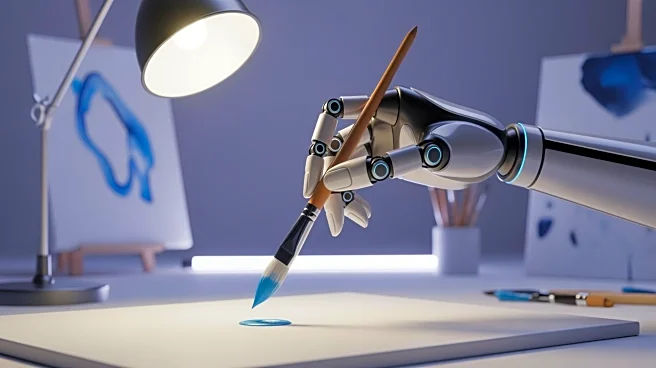What's Happening?
Vince Gilligan, the creator of 'Breaking Bad', has launched a new Apple TV show titled 'Pluribus', which prominently features a disclaimer stating that the show was 'made by humans'. This message is intended to highlight the absence of generative AI in the production
process. Gilligan, known for his work on 'Breaking Bad' and 'Better Call Saul', has expressed strong opposition to AI, describing it as an 'energy-intensive plagiarism machine'. He likens AI-generated content to 'a cow chewing its cud', suggesting it produces repetitive and nonsensical material. 'Pluribus' marks Gilligan's return to science fiction and features Rhea Seehorn, a star from 'Better Call Saul', in a leading role.
Why It's Important?
The emphasis on human creation in 'Pluribus' reflects a growing concern in the entertainment industry about the role of AI in creative processes. As AI technology advances, there is increasing debate over its impact on originality and artistic integrity. Gilligan's stance highlights a broader resistance among creators who fear that AI could undermine the value of human creativity. This development is significant for the U.S. entertainment industry, as it may influence future production practices and the way audiences perceive AI-generated content. The show's approach could inspire other filmmakers to prioritize human involvement in their projects, potentially shaping industry standards.
What's Next?
The release of 'Pluribus' may prompt discussions within the entertainment industry about the ethical implications of AI in content creation. Filmmakers and studios might consider adopting similar disclaimers to assure audiences of human involvement. Additionally, industry stakeholders could engage in debates about the balance between technological innovation and preserving artistic integrity. As AI continues to evolve, regulatory bodies may also explore guidelines to address the use of AI in media production, ensuring transparency and accountability.
Beyond the Headlines
Gilligan's outspoken criticism of AI raises questions about the long-term cultural impact of technology on storytelling. The emphasis on human creativity in 'Pluribus' could contribute to a broader cultural movement advocating for the preservation of traditional artistic methods. This development may also influence public perception of AI, encouraging viewers to critically evaluate the authenticity and originality of content they consume.

















